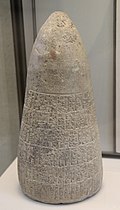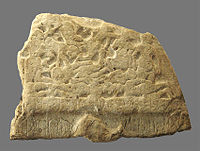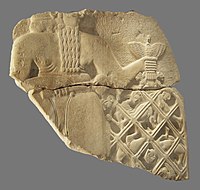Territories/[1] [2] [3] [4] [5]
Egypt Canaan Ebla Mari Kish /Assur Akshak /Akkad Uruk Adab Umma Lagash Ur Elam
4000–3200 BCE
Naqada I Naqada II Egypt-Mesopotamia relations
Pre-Dynastic period (4000–2900 BCE)
Susa I
Uruk period Anu Ziggurat , 4000 BCE)Susa II
3200–3100 BCE
Proto-Dynastic period Naqada III )
Upper Egypt Finger Snail Fish Pen-Abu Animal Stork Canide Bull Scorpion I Shendjw Iry-Hor Ka Scorpion II Narmer / Menes
Lower Egypt Hedju Hor Ny-Hor Hsekiu Khayu Tiu Thesh Neheb Wazner Nat-Hor Mekh Double Falcon Wash
3100–2900 BCE
Early Dynastic Period First Dynasty of Egypt Narmer Palette Narmer Menes Neithhotep ♀ (regent) Hor-Aha Djer Djet Merneith ♀ (regent) Den Anedjib Semerkhet Qa'a Sneferka Horus Bird Canaanites
Jemdet Nasr period Proto-Elamite period Susa III )
2900 BCE
Second Dynasty of Egypt Hotepsekhemwy Nebra/Raneb Nynetjer Ba Nubnefer Horus Sa Weneg-Nebty Wadjenes Senedj Seth-Peribsen Sekhemib-Perenmaat Neferkara I Neferkasokar Hudjefa I Khasekhemwy Early Dynastic Period I (2900–2700 BCE)
First Eblaite First kingdom of Mari Kish I dynastyJushur , Kullassina-bel Nangishlishma ,En-tarah-ana Babum , Puannum , Kalibum
2800 BCE
Kalumum Zuqaqip Atab Mashda Arwium Etana Balih En-me-nuna Melem-Kish Barsal-nuna Uruk I dynastyMesh-ki-ang-gasher
Enmerkar ("conqueror of Aratta ")
2700 BCE
Early Dynastic Period II (2700–2600 BCE)
Zamug , Tizqar , Ilku Iltasadum Lugalbanda Dumuzid, the Fisherman
Enmebaragesi ("made the land of Elam submit")[6]
Aga of Kish Gilgamesh Old Elamite period Indus-Mesopotamia relations
2600 BCE
Third Dynasty of Egypt Djoser Egyptian pyramids )Sekhemkhet Sanakht Nebka Khaba Qahedjet Huni
Early Dynastic Period III (2600–2340 BCE)
Sagisu
Kish II dynastyUhub Mesilim
Ur-Nungal Udulkalama Labashum Lagash En-hegal Lugal-
Ur A-Imdugud Ur-Pabilsag Meskalamdug Puabi )Akalamdug
Enun-dara-anna Mes-he Melamanna Lugal-kitun Adab Nin-kisalsi Lugal-dalu
2575 BCE
Old Kingdom of Egypt Fourth Dynasty of Egypt Snefru Khufu Djedefre Khafre Bikheris Menkaure Shepseskaf Thamphthis Ur I dynasty Mesannepada
2500 BCE
Phoenicia (2500-539 BCE)
Second kingdom of Mari Ikun-Shamash Iku-Shamagan Ansud Sa'umu Ishtup-Ishar Ikun-Mari Iblul-Il Kish III dynasty Ku-Baba ♀
Akshak dynasty Uruk II dynastyEnsha-
Mug-si
Umma I dynastyPabilgagaltuku
Lagash I dynastyUr-Nanshe Akurgal
A'annepada Meskiagnun Elulu Balulu
Awan dynasty
2450 BCE
Fifth Dynasty of Egypt Userkaf Sahure Neferirkare Kakai Neferefre Shepseskare Nyuserre Ini Menkauhor Kaiu Djedkare Isesi Unas
Enar-Damu
Ush Enakalle
Elamite invasions[6] Shushun-
2425 BCE
Kun-Damu
Eannatum
2400 BCE
Adub-DamuIgrish-Halam Irkab-Damu
Kish IV dynastyPuzur-Suen Ur-Zababa
Urur
Lugal-kinishe-dudu Lugal-kisalsi
E-iginimpa'e Meskigal
Ur-Lumma Il Gishakidu Bara-irnun )
Enannatum Entemena Enannatum II Enentarzi
Ur II dynastyKiku-siwe-tempti
2380 BCE
Sixth Dynasty of Egypt Teti Userkare Pepi I Merenre Nemtyemsaf I Pepi II Merenre Nemtyemsaf II Netjerkare Siptah Adab dynastyLugalannemundu
2370 BCE
Isar-Damu
Enna-DaganIshqi-Mari
Invasion by Mari [6]
Ukush
Lugalanda Urukagina
Luh-ishan
2350 BCE
Puzur-Nirah
Uruk III dynastyLugalzagesi
2340 BCE
Akkadian Period (2340–2150 BCE)
Akkadian Empire Sargon of Akkad Rimush Manishtushu
Akkadian Governors: Eshpum Ilshu-rabi Epirmupi Ili-ishmani
2250 BCE
Naram-Sin Lugal-ushumgal
2200 BCE
First Intermediate Period Seventh Dynasty of Egypt Eighth Dynasty of Egypt Menkare Neferkare II Neferkare Neby Djedkare Shemai Neferkare Khendu Merenhor Neferkamin Nikare Neferkare Tereru Neferkahor Neferkare Pepiseneb Neferkamin Anu Qakare Ibi Neferkaure Neferkauhor Neferirkare
Second Eblaite
Third kingdom of Mari Shakkanakku Ishma-Dagan Shar-Kali-Sharri
Igigi , Imi , Nanum , Ilulu (3 years)Dudu Shu-turul
Uruk IV dynastyUr-nigin Ur-gigir
Lagash II dynastyPuzer-Mama Ur-Ningirsu I Pirig-me Hishep-RatepKhita Puzur-Inshushinak
2150 BCE
Ninth Dynasty of Egypt Meryibre Khety Neferkare VII Nebkaure Khety Setut
Ur III period (2150–2000 BCE)
Nûr-Mêr Ishtup-Ilum Ishgum-Addu Apil-kin
Gutian dynasty La-erabum Si'um
Kuda (Uruk)
Umma II dynastyLugalannatum Ur-Baba Gudea Ur-Ningirsu Ur-gar Nam-mahani
Tirigan
2125 BCE
Tenth Dynasty of Egypt Meryhathor Neferkare VIII Wahkare Khety Merykare
Uruk V dynastyUtu-hengal
2100 BCE
(Vassals of UR III)
Iddi-ilum Ili-Ishar Tura-Dagan Puzur-Ishtar [7] Ur III dynasty Ur-Nammu Shulgi Amar-Sin Shu-Sin
2025-1763 BCE
Amorite invasionsIbbi-Sin
Elamite invasionsKindattu (Shimashki Dynasty )
Middle Kingdom of Egypt Eleventh Dynasty of Egypt Mentuhotep I Intef I Intef II Intef III Mentuhotep II Mentuhotep III Mentuhotep IV
Third Eblaite Amorites )Ibbit-Lim Immeya Indilimma
(Amorite Shakkanakkus )Hanun-Dagan Lim Dynasty of Mari Amorites )Yaggid-Lim Yahdun-Lim Yasmah-Adad Zimri-Lim (Queen Shibtu )
Old Assyria Puzur-Ashur I Shalim-ahum Ilu-shuma Erishum I Ikunum Sargon I Puzur-Ashur II Naram-Sin Erishum II
Isin-Larsa period Amorites )Dynasty of Isin Ishbi-Erra Shu-Ilishu Iddin-Dagan Ishme-Dagan Lipit-Eshtar Ur-Ninurta Bur-Suen Lipit-Enlil Erra-imitti Enlil-bani Zambiya Iter-pisha Ur-du-kuga Suen-magir Damiq-ilishu Dynasty of Larsa : Naplanum Emisum Samium Zabaia Gungunum Abisare Sumuel Nur-Adad Sin-Iddinam Sin-Eribam Sin-Iqisham Silli-Adad Warad-Sin Rim-Sin I (...) Rim-Sin II Uruk VI dynasty : Alila-hadum Sumu-binasa Naram-Sin of Uruk Sîn-kāšid Sîn-iribam Sîn-gāmil Ilum-gamil Anam of Uruk Irdanene Rim-Anum Nabi-ilišu
Sukkalmah dynasty Siwe-Palar-Khuppak
Twelfth Dynasty of Egypt Amenemhat I Senusret I Amenemhat II Senusret II Senusret III Amenemhat III Amenemhat IV Sobekneferu ♀
1800–1595 BCE
Thirteenth Dynasty of Egypt Fourteenth Dynasty of Egypt Abraham Biblical )Kings of Byblos Kings of Tyre Kings of Sidon
Yamhad Yamhad dynasty )Old Assyria (Shamshi-Adad dynastyShamshi-Adad I Ishme-Dagan I Mut-Ashkur Rimush Asinum Ashur-dugul Ashur-apla-idi Nasir-Sin Sin-namir Ipqi-Ishtar Adad-salulu Adasi Puzur-Sin Ashur-dugul Ashur-apla-idi Nasir-Sin Sin-namir Ipqi-Ishtar Adad-salulu Adasi Adaside dynasty Bel-bani Libaya Sharma-Adad I Iptar-Sin Bazaya Lullaya Shu-Ninua Sharma-Adad II Erishum III Shamshi-Adad II Ishme-Dagan II Shamshi-Adad III Ashur-nirari I Puzur-Ashur III Enlil-nasir I Nur-ili Ashur-shaduni Ashur-rabi I Ashur-nadin-ahhe I Enlil-Nasir II Ashur-nirari II Ashur-bel-nisheshu Ashur-rim-nisheshu Ashur-nadin-ahhe II
First Babylonian dynasty Amorites )Sumu-abum Sumu-la-El Sin-muballit Sabium Apil-Sin Sin-muballit Hammurabi Samsu-iluna Abi-eshuh Ammi-ditana Ammi-saduqa Samsu-Ditana Early Kassite rulers
Second Babylonian dynastySealand Dynasty ") Ilum-ma-ili Itti-ili-nibi Damqi-ilishu Ishkibal Shushushi Gulkishar m DIŠ+U-ENPeshgaldaramesh Ayadaragalama Akurduana Melamkurkurra Ea-gamil
Second Intermediate Period Sixteenth Dynasty Abydos Dynasty Seventeenth Dynasty
Fifteenth Dynasty of Egypt Hyksos ")Pharaoh Ahmose I slaying a Hyksos Semqen 'Aper-'Anati Sakir-Har Khyan Apepi Khamudi
Mitanni Kirta Shuttarna I Parshatatar
1531–1155 BCE
Tutankhamun New Kingdom of Egypt Eighteenth Dynasty of Egypt Ahmose I Amenhotep I
Third Babylonian dynasty (Kassites ) Agum-Kakrime Burnaburiash I Kashtiliash III Ulamburiash Agum III Karaindash Kadashman-harbe I Kurigalzu I Kadashman-Enlil I Burnaburiash II Kara-hardash Nazi-Bugash Kurigalzu II Nazi-Maruttash Kadashman-Turgu Kadashman-Enlil II Kudur-Enlil Shagarakti-Shuriash Kashtiliashu IV Enlil-nadin-shumi Kadashman-Harbe II Adad-shuma-iddina Adad-shuma-usur Meli-Shipak II Marduk-apla-iddina I Zababa-shuma-iddin Enlil-nadin-ahi
Middle Elamite period
(1500–1100 BCE)Kidinuid dynasty Igehalkid dynasty Untash-Napirisha
Thutmose I Thutmose II Hatshepsut ♀ Thutmose III
Amenhotep II Thutmose IV Amenhotep III Akhenaten Smenkhkare Neferneferuaten ♀ Tutankhamun Ay Horemheb
Hittite Empire Ugarit
Nineteenth Dynasty of Egypt Ramesses I Seti I Ramesses II Merneptah Amenmesses Seti II Siptah Twosret ♀
Elamite Empire Shutrukid dynasty Shutruk-Nakhunte
1155–1025 BCE
Twentieth Dynasty of Egypt Setnakhte Ramesses III Ramesses IV Ramesses V Ramesses VI Ramesses VII Ramesses VIII Ramesses IX Ramesses X Ramesses XI Third Intermediate Period Twenty-first Dynasty of Egypt Smendes Amenemnisu Psusennes I Amenemope Osorkon the Elder Siamun Psusennes II
Phoenicia Kings of Byblos Kings of Tyre Kings of Sidon Kingdom of Israel Saul Ish-bosheth David Solomon
Syro-Hittite states Middle Assyria Eriba-Adad I Ashur-uballit I Enlil-nirari Arik-den-ili Adad-nirari I Shalmaneser I Tukulti-Ninurta I Ashur-nadin-apli Ashur-nirari III Enlil-kudurri-usur Ninurta-apal-Ekur Ashur-dan I Ninurta-tukulti-Ashur Mutakkil-Nusku Ashur-resh-ishi I Tiglath-Pileser I Asharid-apal-Ekur Ashur-bel-kala Eriba-Adad II Shamshi-Adad IV Ashurnasirpal I Shalmaneser II Ashur-nirari IV Ashur-rabi II Ashur-resh-ishi II Tiglath-Pileser II Ashur-dan II
Fourth Babylonian dynasty ("Second Dynasty of Isin ") Marduk-kabit-ahheshu Itti-Marduk-balatu Ninurta-nadin-shumi Nebuchadnezzar I Enlil-nadin-apli Marduk-nadin-ahhe Marduk-shapik-zeri Adad-apla-iddina Marduk-ahhe-eriba Marduk-zer-X Nabu-shum-libur
Neo-Elamite period (1100–540 BCE)
1025–934 BCE
Fifth, Sixth, Seventh, Babylonian dynasties ("Period of Chaos") Simbar-shipak Ea-mukin-zeri Kashshu-nadin-ahi Eulmash-shakin-shumi Ninurta-kudurri-usur I Shirikti-shuqamuna Mar-biti-apla-usur Nabû-mukin-apli
911–745 BCE
Twenty-second Dynasty of Egypt Shoshenq I Osorkon I Shoshenq II Takelot I Osorkon II Shoshenq III Shoshenq IV Pami Shoshenq V Pedubast II Osorkon IV Twenty-third Dynasty of Egypt Harsiese A Takelot II Pedubast I Shoshenq VI Osorkon III Takelot III Rudamun Menkheperre Ini Twenty-fourth Dynasty of Egypt Tefnakht Bakenranef
Kingdom of Samaria Kingdom of Judah
Neo-Assyrian Empire Adad-nirari II Tukulti-Ninurta II Ashurnasirpal II Shalmaneser III Shamshi-Adad V Shammuramat ♀ (regent) Adad-nirari III Shalmaneser IV Ashur-Dan III Ashur-nirari V
Eight Babylonian Dynasty Ninurta-kudurri-usur II Mar-biti-ahhe-iddina Shamash-mudammiq Nabu-shuma-ukin I Nabu-apla-iddina Marduk-zakir-shumi I Marduk-balassu-iqbi Baba-aha-iddina (five kings) Ninurta-apla-X Marduk-bel-zeri Marduk-apla-usur Eriba-Marduk Nabu-shuma-ishkun Nabonassar Nabu-nadin-zeri Nabu-shuma-ukin II Nabu-mukin-zeri Humban-Tahrid dynasty Urtak Teumman Ummanigash Tammaritu I Indabibi Humban-haltash III
745–609 BCE
Twenty-fifth Dynasty of Egypt Taharqa Black Pharaohs ")Piye Shebitku Shabaka Taharqa Tanutamun
Neo-Assyrian Empire (Sargonid dynasty ) Tiglath-Pileser † Shalmaneser † Marduk-apla-iddina II Sargon † Sennacherib † Marduk-zakir-shumi II Marduk-apla-iddina II Bel-ibni Ashur-nadin-shumi † Nergal-ushezib Mushezib-Marduk Esarhaddon † Ashurbanipal Ashur-etil-ilani Sinsharishkun Sin-shumu-lishir Ashur-uballit II
Assyrian conquest of Egypt
Assyrian conquest of Elam
626–539 BCE
Late Period Twenty-sixth Dynasty of Egypt Necho I Psamtik I Necho II Psamtik II Wahibre Ahmose II Psamtik III
Neo-Babylonian Empire Nabopolassar Nebuchadnezzar II Amel-Marduk Neriglissar Labashi-Marduk Nabonidus
Median Empire Deioces Phraortes Madyes Cyaxares Astyages
539–331 BCE
Twenty-seventh Dynasty of Egypt First Achaemenid conquest of Egypt )
Kings of Byblos Kings of Tyre Kings of Sidon
Achaemenid Empire Cyrus Cambyses Darius I Xerxes Artaxerxes I Darius II Artaxerxes II Artaxerxes III Artaxerxes IV Darius III
Twenty-eighth Dynasty of Egypt Twenty-ninth Dynasty of Egypt Thirtieth Dynasty of Egypt
Thirty-first Dynasty of Egypt
331–141 BCE
Argead dynasty and Ptolemaic Egypt Ptolemy I Soter Ptolemy Keraunos Ptolemy II Philadelphus Arsinoe II ♀ Ptolemy III Euergetes Berenice II Euergetis ♀ Ptolemy IV Philopator Arsinoe III Philopator ♀ Ptolemy V Epiphanes Cleopatra I Syra ♀ Ptolemy VI Philometor Ptolemy VII Neos Philopator Cleopatra II Philometor Soter ♀ Ptolemy VIII Physcon Cleopatra III ♀ Ptolemy IX Lathyros Cleopatra IV ♀ Ptolemy X Alexander Berenice III ♀ Ptolemy XI Alexander Ptolemy XII Auletes Cleopatra V ♀ Cleopatra VI Tryphaena ♀ Berenice IV Epiphanea ♀ Ptolemy XIII Ptolemy XIV Cleopatra VII Philopator ♀ Ptolemy XV Caesarion Arsinoe IV ♀
Hellenistic Period Seleukos I Nikator Tetradrachm from Babylon Argead dynasty Alexander III Philip III Alexander IV Antigonid dynasty Antigonus I Seleucid Empire Seleucus I Antiochus I Antiochus II Seleucus II Seleucus III Antiochus III Seleucus IV Antiochus IV Antiochus V Demetrius I Alexander III Demetrius II Antiochus VI Dionysus Diodotus Tryphon Antiochus VII Sidetes
141–30 BCE
Kingdom of Judea Simon Thassi John Hyrcanus Aristobulus I Alexander Jannaeus Salome Alexandra ♀ Hyrcanus II Aristobulus II Antigonus II Mattathias
Alexander II Zabinas Seleucus V Philometor Antiochus VIII Grypus Antiochus IX Cyzicenus Seleucus VI Epiphanes Antiochus X Eusebes Antiochus XI Epiphanes Demetrius III Eucaerus Philip I Philadelphus Antiochus XII Dionysus Antiochus XIII Asiaticus Philip II Philoromaeus
Parthian Empire Mithridates I Phraates Hyspaosines Artabanus Mithridates II Gotarzes Mithridates III Orodes I Sinatruces Phraates III Mithridates IV Orodes II Phraates IV Tiridates II Musa Phraates V Orodes III Vonones I Artabanus II Tiridates III Artabanus II Vardanes I Gotarzes II Meherdates Vonones II Vologases I Vardanes II Pacorus II Vologases II Artabanus III Osroes I
30 BCE–116 CE
Roman Empire
(Roman conquest of Egypt )Province of Egypt
Judea
Syria
116–117 CE
Province of Mesopotamia under Trajan
Parthamaspates of Parthia
117–224 CE
Syria Palaestina
Province of Mesopotamia
Sinatruces II Mithridates V Vologases IV Osroes II Vologases V Vologases VI Artabanus IV
224–270 CE
Sasanian Empire Province of Asoristan Coin of Ardashir I, Hamadan mint. Ardashir I Shapur I Hormizd I Bahram I Bahram II Bahram III Narseh Hormizd II Adur Narseh Shapur II Ardashir II Shapur III Bahram IV Yazdegerd I Shapur IV Khosrow Bahram V Yazdegerd II Hormizd III Peroz I Balash Kavad I Jamasp Kavad I Khosrow I Hormizd IV Khosrow II Bahram VI Chobin Vistahm
270–273 CE
Palmyrene Empire Vaballathus Zenobia ♀ Antiochus
273–395 CE
Roman Empire
Province of Egypt
Syria Palaestina
Syria
Province of Mesopotamia
395–618 CE
Byzantine Empire
Byzantine Egypt
Palaestina Prima , Palaestina Secunda
Byzantine Syria
Byzantine Mesopotamia
618–628 CE
(Sasanian conquest of Egypt )Province of Egypt Shahrbaraz Sahralanyozan Shahrbaraz
Sasanian Empire Province of Asoristan Khosrow II Kavad II
628–641 CE
Byzantine Empire Ardashir III Shahrbaraz Khosrow III Boran ♀ Shapur-i Shahrvaraz Azarmidokht ♀ Farrukh Hormizd Hormizd VI Khosrow IV Boran Yazdegerd III Peroz III Narsieh
Byzantine Egypt
Palaestina Prima , Palaestina Secunda
Byzantine Syria
Byzantine Mesopotamia
639–651 CE
Muslim conquest of Egypt Muslim conquest of the Levant Muslim conquest of Mesopotamia and Persia
Chronology of the Neolithic period
Rulers of Ancient Central Asia




















